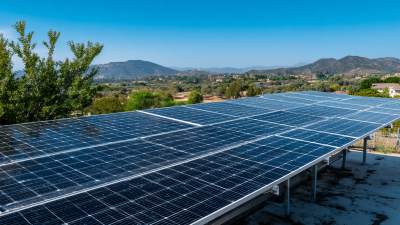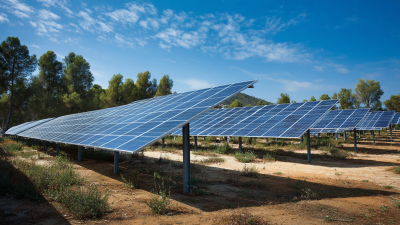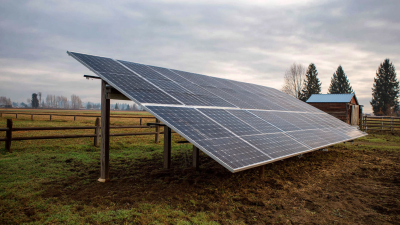Blog
7 Essential Reasons to Choose Solar Panels for Your House
As the demand for sustainable energy solutions rises, the conversation around solar panels for houses has gained significant momentum. According to the Solar Energy Industries Association (SEIA), residential solar installations in the United States have increased by over 167% over the past decade, reflecting a growing recognition of the benefits associated with this renewable resource. Furthermore, a report by the National Renewable Energy Laboratory (NREL) indicates that homeowners can save an average of $20,000 on energy costs over 20 years with the adoption of solar technology. Beyond financial savings, solar panels for houses can significantly reduce carbon footprints and enhance property values, making them an essential consideration for environmentally-conscious homeowners. This blog will explore seven compelling reasons to invest in solar panels for your house, highlighting their potential to transform energy usage, promote sustainability, and contribute to a cleaner future.

Benefits of Solar Energy: Why Homeowners Should Invest in Solar Panels
Investing in solar panels has become an increasingly popular choice for homeowners, and for good reason. According to the Solar Energy Industries Association (SEIA), the average cost of solar installations has dropped by nearly 70% over the past decade, making solar energy more accessible to homeowners than ever before. This decline in price is coupled with significant advancements in technology, making systems more efficient and durable, which can lead to substantial long-term savings on energy bills.
Beyond the financial incentives, switching to solar energy presents a compelling opportunity for environmental benefits. The U.S. Environmental Protection Agency (EPA) estimates that solar energy systems can mitigate approximately 20,000 pounds of carbon dioxide emissions over their lifespan, contributing to cleaner air and a healthier planet. Furthermore, solar energy increases a home's value. A study by the National Renewable Energy Laboratory indicates that homes equipped with solar panels can sell for an average of 4.1% more than comparable homes without them. These compelling reasons highlight why now is the opportune time for homeowners to invest in solar energy solutions.
Understanding the Financial Savings: Analyzing the Long-Term Cost Benefits of Solar
As homeowners continue to seek sustainable energy solutions, the long-term financial benefits of installing solar panels are increasingly coming to light. According to a report by the National Renewable Energy Laboratory (NREL), residential solar energy systems can reduce electricity bills by up to 70% over their lifetime. Moreover, the average savings from solar energy installations range between $10,000 and $30,000, depending on location and energy consumption patterns. This significant reduction in utility expenses makes solar panels not only an eco-friendly choice but also a savvy financial investment.
Additionally, the decreasing costs associated with solar technology further enhance its economic appeal. The Solar Energy Industries Association (SEIA) indicates that solar panel prices have dropped by nearly 90% over the past decade. This trend, combined with generous federal tax incentives—currently offering a 26% tax credit for solar installation—makes now an opportune time for homeowners to capitalize on solar power. By investing in solar panels, homeowners not only contribute to a greener planet but also position themselves for substantial long-term savings, providing both immediate and future financial relief.
Environmental Impact: Quantifying the Reduction of Carbon Footprint with Solar Power
The environmental impact of incorporating solar panels into your home is profound, particularly when it comes to reducing your carbon footprint. According to the U.S. Department of Energy, the average residential solar system can offset approximately 3 to 4 tons of carbon dioxide emissions annually, which is equivalent to the energy used by a typical home over several months. By harnessing solar energy, homeowners are not only saving on electricity bills but also contributing to a significant decrease in greenhouse gas emissions that contribute to climate change.
Tip: To maximize the environmental benefits of solar panels, consider implementing energy-efficient appliances and reducing energy consumption in your home. This can amplify the carbon reduction effect of your solar system.
Moreover, a report from the National Renewable Energy Laboratory states that shifting to solar energy can reduce reliance on fossil fuels, leading to cleaner air and minimized water usage in power production. Transitioning to solar not only leads to energy independence but also helps mitigate the negative impacts of air pollution, which is linked to serious health issues.
Tip: Regular maintenance of solar panels can ensure they operate at peak efficiency, providing maximum environmental and financial benefits. Clean panels can increase energy production and further reduce your carbon footprint.
Government Incentives: Exploring Tax Credits and Rebates for Solar Panel Installation
 When considering solar panel installation for your home, one of the most significant advantages is the array of government incentives available. Tax credits and rebates are designed to encourage homeowners to invest in renewable energy, making solar more accessible and financially viable. For instance, the Federal Investment Tax Credit (ITC) allows homeowners to deduct up to 26% of the installation costs from their federal taxes if the system is installed by the end of 2022, dropping to 22% in 2023. According to the Solar Energy Industries Association (SEIA), this credit has been a major driver in the exponential growth of solar installations across the United States, leading to a 167% increase from 2016 to 2021.
When considering solar panel installation for your home, one of the most significant advantages is the array of government incentives available. Tax credits and rebates are designed to encourage homeowners to invest in renewable energy, making solar more accessible and financially viable. For instance, the Federal Investment Tax Credit (ITC) allows homeowners to deduct up to 26% of the installation costs from their federal taxes if the system is installed by the end of 2022, dropping to 22% in 2023. According to the Solar Energy Industries Association (SEIA), this credit has been a major driver in the exponential growth of solar installations across the United States, leading to a 167% increase from 2016 to 2021.
In addition to federal incentives, many states and local governments offer their own rebates and tax incentives. States like California and New York boast programs that can provide additional savings, sometimes covering a significant portion of installation costs. A report by the National Renewable Energy Laboratory (NREL) highlighted that homeowners can save an average of $10,000 to $30,000 over 20 years through these local programs, making solar panels not only a sustainable choice but also a financially smart one. By taking advantage of these incentives, homeowners can significantly reduce their upfront costs and transition to clean energy with greater ease.
Boosting Property Value: How Solar Panels Improve Real Estate Worth and Market Appeal
When considering the value of your home, installing solar panels can be a game-changer. Not only does solar energy provide substantial savings on electricity bills, but it also significantly enhances your property’s market appeal. Recent studies indicate that homes with solar panels can sell for an impressive 4.1% more than their non-solar counterparts. This increased demand underscores how environmentally conscious buyers are prioritizing energy efficiency in their home purchases.
As the cost of solar power continues to decrease, it has become a financially savvy investment that aligns with contemporary real estate trends. With energy efficiency becoming a top priority for many homebuyers, properties equipped with solar technology naturally rise in value. As highlighted by real estate experts, making homes more energy efficient—alongside other upgrades—will play a crucial role in boosting overall property worth. In this evolving housing market, overlooking the benefits of solar panels could mean missing out on a valuable opportunity to enhance your home's appeal and investment potential.





